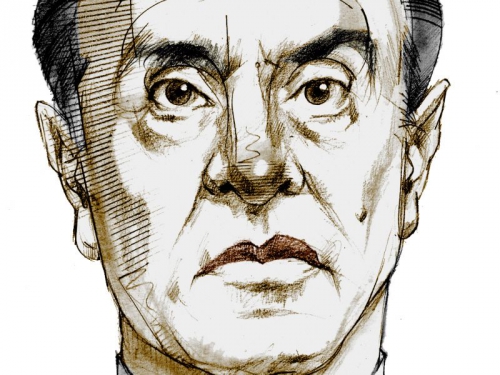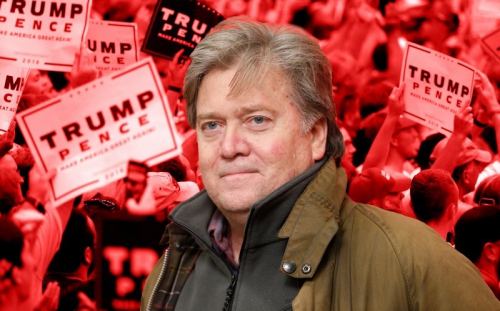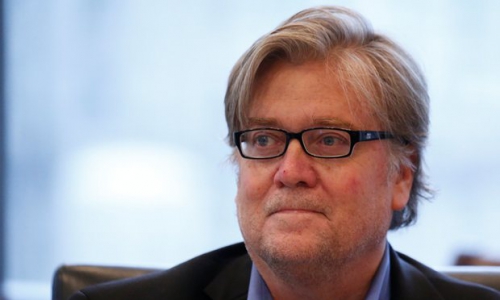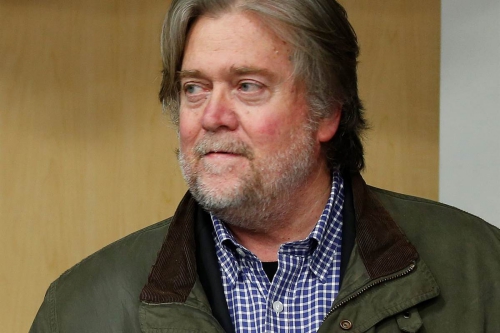
Bannon: un guénonien à Washington D.C.?
Ex: http://www.dedefensa.org
On a déjà beaucoup parlé de Stephen Bannon, ce “conseiller stratégique” du président Trump et, semble-t-il, le conseiller le plus écouté jusqu’à être considéré, – selon certains points de vue, – comme l’éminence grise et l’inspirateur de Trump. L’on sait également que Bannon a déjà beaucoup suscité de commentaires avec certaines de ses conceptions, notamment et précisément son idée selon laquelle il faut “détruire tout le Système” (cette expression étant une interprétation de certaines déclarations et écrits, qui s’éclaireront plus loin). (... Et nous laissons bien entendu de côté les sornettes insupportables de médiocrité, issues des complexes et obsessions postmodernismes, sur son prétendu “suprémacisme blanc” et le reste. Ce faisant, nous laissons les esprits forts et flics de la postmodernité jouer avec leurs poussières.) Or, voici un texte particulièrement intéressant à cet égard, que nous comptons utiliser comme une des références pour un prochain F&C consacré à la question que soulève le cas Bannon, du point de vue de notre civilisation et de son destin dans l’arrangement cosmique du monde... Pas moins, chers lecteurs.
Le texte est d’Alastair Crooke, dans Consortium News, le 10 mars. Nous connaissons Crooke que nous avons souvent cité, et qu’il nous est arrivé de rencontrer pour mieux apprécier ses qualités. Nous ferons deux remarques à son propos, qui situeront parfaitement l’appréciation que nous en avons, et par conséquent une façon de voir ce qu'on peut accorder de crédit au texte que nous examinons.
• Cet ancien officier du MI6 devenu conseiller du Haut Représentant de l’UE Solana au début des années 2000, a choisi ensuite la voie très difficile de l’indépendance en créant son institut dit Conflict Forum. Basé au Liban puis replié sur l’Italie, Crooke poursuit un chemin ardu, sans soutien institutionnalisé, caractérisé par une rupture avec la pensée dominante, ditto le Système. Ses positions sont évidemment elles-mêmes en rupture complète avec la doxa-Système et sa carrière nous garantit que ses jugements sont nourris de la rigueur et de l’expérience professionnelles qui lui sont naturelles.
• Crooke est un homme affable et doux, au jugement rationnel et d’une très grande culture, qui a l’habitude d’observer les divers problèmes soulevés par la Grande Crise générale du point de vue d’un érudit particulièrement versé dans les conceptions liées à la pensée de la Tradition. Il est un de ces esprits qui commentent les événements en ayant comme référence les grands courants philosophiques qui l’intéressent. Très grand connaisseur des questions de l’Islam, hors des analyses hystériquement artificielles sur l’“islamisme” extrémisme-terroriste et l’“islamophobie” qui lui répond, – caricature postmoderniste contre caricature postmoderniste, – on peut très bien lors d’une discussion avec lui se trouver entraînés dans une réflexion commune sur le néoplatonisme sans avoir le sentiment de se trouver hors-sujet.
Ce qui passionne Crooke dans la personne de Bannon, et par conséquent dans la sorte d’influence qu’il exercerait sur un Trump qui apparaîtrait lui-même intellectuellement bien plus conséquent qu’on ne croit, c’est la conscience qu’a le personnage de la profondeur vertigineuse de la Grande Crise. L’intérêt que présentent la personnalité et l’expérience de Bannon est qu’il a lui aussi, de son côté, à côté de positions théoriques très marquées, une expérience professionnelle également très marquée des instruments fondamentaux, déstructurants et dissolvants, de la postmodernité et du Système, ; il a en effet travaillé à Hollywood comme scénariste et réalisateur (son film Generation Zero) et à Wall Street, chez Goldman-Sachs, avant de passer à Breitbart.News.
(C’est une démarche courante aujourd’hui, qui demande une grande attention de la psychologie, une grande souplesse de l’esprit et de son jugement. Ce qui peut être d’abord perçu comme des signes de compromission avec le Système du point de vue des antiSystème, peut également, par éventuelle inversion vertueuse et suivant une enquête éclairée, être vu au contraire comme des instruments d’une connaissance éventuellement décisive de l’adversaire, “de l’intérieur”.)
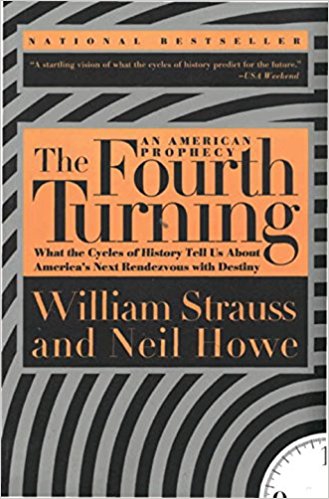 Bannon est extrêmement influencé par les travaux de deux commentateurs de la sorte que nous nommerions “crisologues” tant le concept de crise (crisologie) est au centre de toutes nos réflexions, Neil Howe et William Strauss, auteurs de An American Prophecy, en 1997. Les deux auteurs adoptent une approche de l’actuelle situation, – la grande Crise se faisant déjà sentir dès la fin du communisme avec la mise en cause radicale de la notion de Progrès, – qui se réfère aux théories cycliques de la Tradition. « [Leur] analyse rejette les promesses des historiens occidentaux modernes de développement social et économie linéaire (progrès continuel et déclin) ou chaotique (trop de complexité pour révéler n’importe quelle direction). Au lieu de cela, ils adoptent la vision d’à peu près toutes les sociétés traditionnelles : que le temps social est un temps cyclique dans lequel les événements sont significatifs seulement dans la mesure où ils sont caractérisés par ce que le philosophe Mircea Eliade nommait “reconstitution”. Dans l’espace cyclique, une fois que vous avez écarté les accidents accessoires et sans signification, ainsi que la technologie, il vous reste un nombre limité de conceptions sociales, qui tendent à se répéter selon un ordre bien fixé... »
Bannon est extrêmement influencé par les travaux de deux commentateurs de la sorte que nous nommerions “crisologues” tant le concept de crise (crisologie) est au centre de toutes nos réflexions, Neil Howe et William Strauss, auteurs de An American Prophecy, en 1997. Les deux auteurs adoptent une approche de l’actuelle situation, – la grande Crise se faisant déjà sentir dès la fin du communisme avec la mise en cause radicale de la notion de Progrès, – qui se réfère aux théories cycliques de la Tradition. « [Leur] analyse rejette les promesses des historiens occidentaux modernes de développement social et économie linéaire (progrès continuel et déclin) ou chaotique (trop de complexité pour révéler n’importe quelle direction). Au lieu de cela, ils adoptent la vision d’à peu près toutes les sociétés traditionnelles : que le temps social est un temps cyclique dans lequel les événements sont significatifs seulement dans la mesure où ils sont caractérisés par ce que le philosophe Mircea Eliade nommait “reconstitution”. Dans l’espace cyclique, une fois que vous avez écarté les accidents accessoires et sans signification, ainsi que la technologie, il vous reste un nombre limité de conceptions sociales, qui tendent à se répéter selon un ordre bien fixé... »
Les deux auteurs identifient quatre phases (quatre Turnings) dans le cycle, High, Awakening, Unravelling et Crisis, – étant entendu et étant évident que nous nous trouvons dans une quatrième phase du cycle donné qui voit évoluer notre civilisation et notre destin. Bien entendu, cette schématisation est irrésistiblement identifiable comme étant de type guénonien, c’est-à-dire selon la référence classique, et considérée par Guénon lui-même comme “universelle” du Manvatara hindouiste des quatre âges (Or, Argent, Airain et Fer), et référence effectivement de la Tradition et de toutes les doctrines qui s’y rapportent. Bien entendu encore, cette sorte de conception s’oppose d’une façon fondamentale et universelle à toutes les idées et conceptions de type moderniste. On a là, bien entendu toujours, une clef solide et fort bien ciselée pour expliquer la haine absolument diabolique, – le qualificatif sonne bien et juste, – qui accompagne Trump, son administration, et bien sûr son conseiller Bannon identifié comme le Diable en personne. (Ce qui est somme toute inacceptable comme on le comprend aisément, car il doit être admis que le Diable ne peut supporte ni admettre d’être plagié ni imité de quelque façon que ce soit...)
Dans les conceptions de Bannon, et puisque nous nous trouvons comme toutes les traditions s’accordent à le penser dans une fin de cycle, à la fois crisique et catastrophique, il y a comme une pressante et impérative nécessité d’aller jusqu’au bout de la catastrophe. Il se trouve, observe Crooke, que cette conception rencontre, ou se rapproche en la croisant, de certaines conceptions de Trump lui-même, exprimées dès 2000, selon l’extrême probabilité d’une catastrophe économique, financière et sociale, avec l’idée implicite de la nécessité de cette catastrophe pour parvenir à une sorte de “renaissance”.
(On pourrait penser qu’il y a là une idée qui pourrait aussi bien trouver sa symbolisation triviale dans l’expression que Trump employait pour indiquer qu’il allait attaquer la corruption, le clientélisme, etc., de l’establishment. “Drainer le cloaque” pourrait aussi bien s’appliquer à la nécessité de porter la Grande crise à son extrême catastrophique.)
On comprend l’intérêt de cette analyse, surtout dans le climat actuel qui ne cesse d’évoluer vers un catastrophisme quasiment opérationnel, laissant loin derrière lui les seules craintes de crises parcellaires, n’affectant qu’un seul domaine, et qui sont finalement des crises “rassurantes” pour le Système as a whole (comme celle de l’automne 2008, par exemple). Il y a maintenant plusieurs années qu’on ne mesure plus les possibilités de crise aux seuls chiffres du chômage, de la Bourse ou de la croissance, mais que le sentiment général est celui d’une crise de civilisation en train de se préparer ou déjà en train de se dérouler, affectant par définition tous les domaines, un bouleversement à la fois métahistorique et eschatologique.
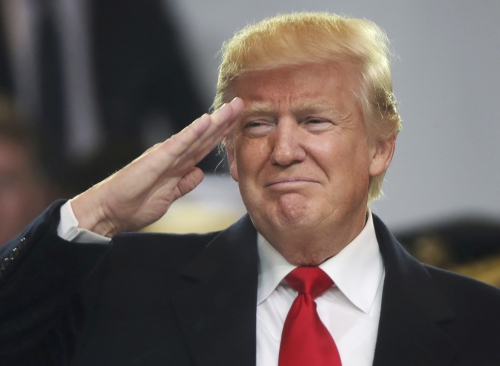
La question que soulèvent ces réflexions concerne bien entendu la signification réelle de la politique Trump, ou de ce qu’on perçoit comme étant une antipolitique, sinon une non-politique, – ce qui est un objet de très nombreuses interrogations et supputations depuis deux mois. (Trump est-il prisonnier du Système ? Trump a-t-il capitulé devant le Système ? Trump est-il un faux-nez du Système ? Trump est-il un comploteur ? Trump est-il un crétin? Trump est-il fou ? Etc.) Dans le chef de cette “politique“ qui a les allures d’une non-politique, peut-on concevoir que la politique de Trump soit une démarche volontaire à la finalité aussi vertigineuse, et peut-on concevoir qu’on puisse définir et accomplir une politique qui soit le contraire du concept de politique, accompagnant un processus de destruction-reconstruction, de chaos-renaissance, etc. ? Bien entendu, on voit combien cette sorte d’hypothèse s’accorde avec l’observation que nous faisons souvent du processus de surpuissance-autodestruction caractérisant le Système. Il y a là un courant d’hypothèses qui tend à s’orienter vers les attentes intellectuelles, sinon spirituelles, qu’a fait naître le développement des événements depuis quelques années (depuis 9/11, depuis l’automne 2008, depuis le “printemps arabe” de 2010, et singulièrement depuis le “coup de Kiev” de février 2014 et jusqu’au Brexit et USA-2016 avec Trump).
dedefensa.org
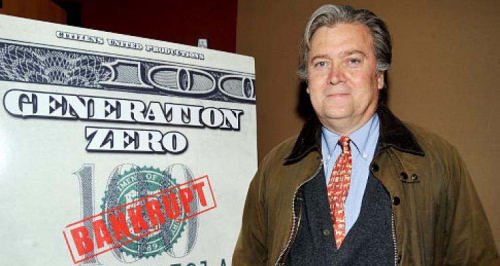
Steve Bannon’s Apocalyptic ‘Unravelling’
by Alastair Crooke
Steve Bannon is accustomed to start many of his talks to activists and Tea Party gatherings in the following way: “At 11 o’clock on 18 September 2008, Hank Paulson and Ben Bernanke told the U.S. President that they had already stove-piped $500 billions of liquidity into the financial system during the previous 24 hours – but needed a further one Trillion dollars, that same day.
“The pair said that if they did not get it immediately, the U.S. financial system would implode within 72 hours; the world’s financial system, within three weeks; and that social unrest and political chaos could ensue within the month.” (In the end, Bannon notes, it was more like $5 trillion that was required, though no one really knows how much, as there has been no accounting for all these trillions).
“We (the U.S.) have”, he continues, “in the wake of the bailouts that ensued, liabilities of $200 trillions, but net assets – including everything – of some $50-60 trillion.” (Recall that Bannon is himself a former Goldman Sachs banker).
“We are upside down; the industrial democracies today have a problem we have never had before; we are over-leveraged (we have to go through a massive de-leveraging); and we have built a welfare state which is completely and totally unsupportable.
“And why this is a crisis … the problem … is that the numbers have become so esoteric that even the guys on Wall Street, at Goldman Sachs, the guys I work with, and the Treasury guys … It’s so tough to get this together … Trillion dollar deficits … etcetera.”
But, Bannon says — in spite of all these esoteric, unimaginable numbers wafting about — the Tea Party women (and it is mainly led by women, he points out) get it. They know a different reality: they know what groceries now cost, they know their kids have $50,000 in college debt, are still living at home, and see no jobs in prospect: “The reason I called the film Generation Zero is because this generation, the guys in their 20s and 30s: We’ve wiped them out.”
And it’s not just Bannon. A decade earlier, in 2000, Donald Trump was writing in a very similar vein in a pamphlet that marked his first toying with the prospect of becoming a Presidential candidate: “My third reason for wanting to speak out is that I see not only incredible prosperity … but also the possibility of economic and social upheaval … Look towards the future, and if you are like me, you will see storm clouds brewing. Big Trouble. I hope I am wrong, but I think we may be facing an economic crash like we’ve never seen before.”
And before the recent presidential election, Donald Trump kept to this same narrative: the stock market was dangerously inflated. In an interview on CNBC, he said, “I hope I’m wrong, but I think we’re in a big, fat, juicy bubble,” adding that conditions were so perilous that the country was headed for a “very massive recession” and that “if you raise interest rates even a little bit, (everything’s) going to come crashing down.”
The Paradox
And here, precisely, is the paradox: Why — if Trump and Bannon view the economy as already over-leveraged, excess-bubbled, and far too fragile to accommodate even a small interest rate rise — has Trump (in Mike Whitney’s words) “promised … more treats and less rules for Wall Street … tax cuts, massive government spending, and fewer regulations … $1 trillion in fiscal stimulus to rev up consumer spending and beef up corporate profits … to slash corporate tax rates and fatten the bottom line for America’s biggest businesses. And he’s going to gut Dodd-Frank, the ‘onerous’ regulations that were put in place following the 2008 financial implosion, to prevent another economy-decimating cataclysm.”
Does President Trump see the world differently, now that he is President? Or has he parted company with Bannon’s vision?
Though Bannon is often credited – though most often, by a hostile press, aiming to present Trump (falsely) as the “accidental President” who never really expected to win – as the intellectual force behind President Trump. In fact, Trump’s current main domestic and foreign policies were all presaged, and entirely present, in Trump’s 2000 pamphlet.
In 2000, Bannon was less political, screenwriter Julia Jones, a long-time Bannon collaborator, notes. “But the Sept. 11 attacks,” Ms. Jones says, “changed him” and their Hollywood collaboration did not survive his growing engagement with politics.
Bannon himself pins his political radicalization to his experience of the 2008 Great Financial Crisis. He detested how his Goldman colleagues mocked the Tea Party’s “forgotten” ones. As Ms. Jones sees it, a more reliable key to Bannon’s worldview lies in his military service.

“He has a respect for duty,” she said in early February. “The word he has used a lot is ‘dharma.’” Mr. Bannon found the concept of dharma in the Bhagavad Gita, she recalls. It can describe one’s path in life or one’s place in the universe.
There is no evidence, however, that President Trump either has changed his economic views or that he has diverged in his understanding of the nature of the crisis facing America (and Europe).
Tests Ahead
Both men are very smart. Trump understands business, and Bannon finance. They surely know the headwinds they face: the looming prospect of a wrangle to increase the American $20 trillion “debt ceiling” (which begins to bite on March 15), amid a factious Republican Party, the improbability of the President’s tax or fiscal proposals being enacted quickly, and the likelihood that the Federal Reserve will hike interest rates, “until something breaks.” If they are so smart, what then is going on?
What Bannon has brought to the partnership however, is a clear articulation of the nature of this “crisis” in his Generation Zero film, which explicitly is built around the framework of a book called The Fourth Turning: An American Prophecy, written in 1997 by Neil Howe and William Strauss.
In the words of one of the co-authors, the analysis “rejects the deep premise of modern Western historians that social time is either linear (continuous progress or decline) or chaotic (too complex to reveal any direction). Instead we adopt the insight of nearly all traditional societies: that social time is a recurring cycle in which events become meaningful only to the extent that they are what philosopher Mircea Eliade calls ‘reenactments.’ In cyclical space, once you strip away the extraneous accidents and technology, you are left with only a limited number of social moods, which tend to recur in a fixed order.”
Howe and Strauss write: “The cycle begins with the First Turning, a ‘High’ which comes after a crisis era. In a High, institutions are strong and individualism is weak. Society is confident about where it wants to go collectively, even if many feel stifled by the prevailing conformity.
“The Second Turning is an ‘Awakening,’ when institutions are attacked in the name of higher principles and deeper values. Just when society is hitting its high tide of public progress, people suddenly tire of all the social discipline and want to recapture a sense of personal authenticity.
“The Third Turning is an ‘Unravelling,’ in many ways the opposite of the High. Institutions are weak and distrusted, while individualism is strong and flourishing.
“Finally, the Fourth Turning is a ‘Crisis’ period. This is when our institutional life is reconstructed from the ground up, always in response to a perceived threat to the nation’s very survival. If history does not produce such an urgent threat, Fourth Turning leaders will invariably find one — and may even fabricate one — to mobilize collective action. Civic authority revives, and people and groups begin to pitch in as participants in a larger community. As these Promethean bursts of civic effort reach their resolution, Fourth Turnings refresh and redefine our national identity.” (Emphasis added).
Woodstock Generation
Bannon’s film focuses principally on the causes of the 2008 financial crisis, and on the “ideas” that arose amongst the “Woodstock generation” (the Woodstock musical festival occurred in 1969), that permeated, in one way or another, throughout American and European society.
The narrator calls the Woodstock generation the “Children of Plenty.” It was a point of inflection: a second turning “Awakening”; a discontinuity in culture and values. The older generation (that is, anyone over 30) was viewed as having nothing to say, nor any experience to contribute. It was the elevation of the “pleasure principle” (as a “new” phenomenon, as “their” discovery), over the puritan ethic; It celebrated doing one’s own thing; it was about “Self” and narcissism.
The “Unravelling” followed in the form of government and institutional weakness: the “system” lacked the courage to take difficult decisions. The easy choices invariably were taken: the élites absorbed the self-centered, spoilt-child, ethos of the “me” generation. The 1980s and 1990s become the era of “casino capitalism” and the “Davos man.”
The lavish taxpayer bailouts of the U.S. banks after the Mexican, Russian, Asian and Argentinian defaults and crises washed away the bankers’ costly mistakes. The 2004 Bear Stearns exemption which allowed the big five banks to leverage their lending above 12:1 – and, which quickly extended to become 25:1, 30:1 and even 40:1 – permitted the irresponsible risk-taking and the billions in profit-making. The “Dot Com” bubble was accommodated by monetary policy – and then the massive 2008 bailouts accommodated the banks, yet again.
The “Unravelling” was essentially a cultural failure: a failure of responsibility, of courage to face hard choices – it was, in short, the film suggests, an era of spoilt institutions, compromised politicians and irresponsible Wall Streeters – the incumbent class – indulging themselves, and “abdicating responsibility.”
Now we have entered the “Fourth Turning”: “All the easy choices are back of us.” The “system” still lacks courage. Bannon says this period will be the “nastiest, ugliest in history.” It will be brutal, and “we” (by which he means the Trump Tea Party activists) will be “vilified.” This phase may last 15 – 20 years, he predicts.
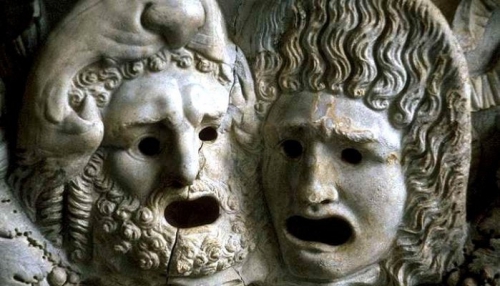
Greek Tragedy
The key to this Fourth Turning is “character.” It is about values. What Bannon means by “our crisis” is perhaps best expressed when the narrator says: “the essence of Greek tragedy is that it is not like a traffic accident, where somebody dies [i.e. the great financial crises didn’t just arise by mischance].
The Greek sense is that tragedy is where something happens because it has to happen, because of the nature of the participants. Because the people involved, make it happen. And they have no choice to make it happen, because that’s their nature.”
This is the deeper implication of what transpired from Woodstock: the nature of people changed. The “pleasure principle,” the narcissism, had displaced the “higher” values that had made America what it was. The generation that believed that there was “no risk, no mountain they could not climb” brought this crisis upon themselves. They wiped out 200 years of financial responsibility in about 20 years. This, it appears, captures the essence of Bannon’s thinking.
That is where we are, Bannon asserts: Stark winter inevitably follows, after a warm, lazy summer. It becomes a time of testing, of adversity. Each season in nature has its vital function. Fourth turnings are necessary: they a part of the cycle of renewal.
Bannon’s film concludes with author Howe declaring: “history is seasonal and winter is coming,”
And, what is the immediate political message? It is simple, the narrator of Bannon’s film says: “STOP”: stop doing what you were doing. Stop spending like before. Stop taking on spending commitments that cannot be afforded. Stop mortgaging your children’s future with debt. Stop trying to manipulate the banking system. It is a time for tough thinking, for saying “no” to bailouts, for changing the culture, and re-constructing institutional life.
Cultural Legacy
And how do you re-construct civic life? You look to those who still possess a sense of duty and responsibility – who have retained a cultural legacy of values. It is noticeable that when Bannon addresses the activists, almost the first thing he does is to salute the veterans and serving officers, and praise their qualities, their sense of duty.
It is no surprise then that President Trump wants to increase both the veterans’ and the military’s budget. It is not so much a portent of U.S. military belligerence, but more that he sees them as warriors for the coming “winter” of testing and adversity. Then, and only then does Bannon speak to the “thin blue line” of activists who still have strength of character, a sense of responsibility, of duty. He tells them that the future rests in their hands, alone.
Does this sound like men – Bannon and Trump – who want to ramp up a fresh financial bubble, to indulge the Wall Street casino (in their words)? No? So, what is going on?
They know “the crisis” is coming. Let us recall what Neil Howe wrote in the Washington Post concerning the “Fourth Turning”:
“This is when our institutional life is reconstructed from the ground up, always in response to a perceived threat to the nation’s very survival. If history does not produce such an urgent threat, Fourth Turning leaders will invariably find one — and may even fabricate one — to mobilize collective action. Civic authority revives, and people and groups begin to pitch in as participants in a larger community. As these Promethean bursts of civic effort reach their resolution, Fourth Turnings refresh and redefine our national identity.”
Trump has no need to “fabricate” a financial crisis. It will happen “because it has to happen, because of the nature of the participants (in the current ‘system’). Because the people involved, make it happen. And they have no choice to make it happen, because that’s their nature.”
It is not even President Obama’s or Treasury Secretary Hank Paulson’s fault, per se. They are just who they are.
Trump and Bannon therefore are not likely trying to ignite the “animal spirits” of the players in the financial “casino” (as many in the financial sphere seem to assume). If Bannon’s film and Trump’s articulation of crisis mean anything, it is that their aim is to ignite the “animal spirits” of “the working-class casualties and those forgotten Americans” of the Midwest, Michigan, Indiana, Ohio, Wisconsin and Pennsylvania.
At that point, they hope that the “thin blue line” of activists will “pitch in” with a Promethean burst of civic effort which will reconstruct America’s institutional and economic life.
If this is so, the Trump/Bannon vision both is audacious – and quite an extraordinary gamble …
Alastair Crooke
»Stephen Bannon zum ›chief of staff‹ zu ernennen, wäre wie Götz Kubitschek oder Jürgen Elsässer zum Kanzleramtsminister zu machen #Trump«, tweetete [1] der Spiegel-Deutschlandredakteur Wolf Wiedmann-Schmidt am 12. November, pünktlich zu Beginn des Ringens um die Besetzung des neuen US-Kabinetts unter dem designierten Präsidenten Donald J. Trump.

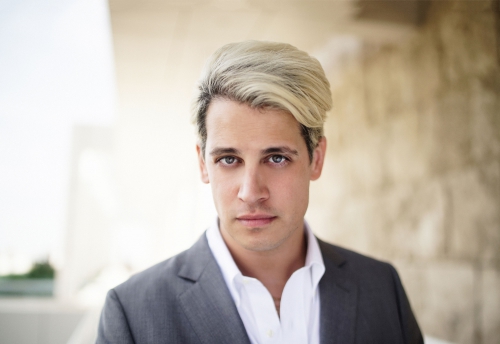



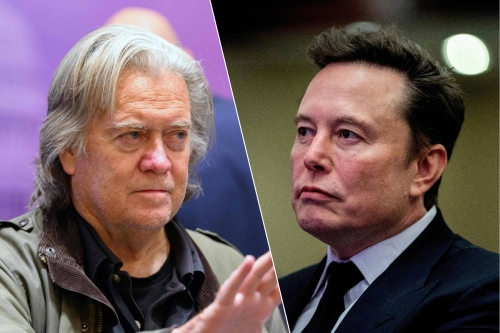

 del.icio.us
del.icio.us
 Digg
Digg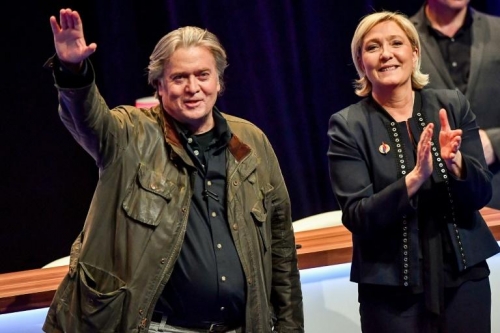
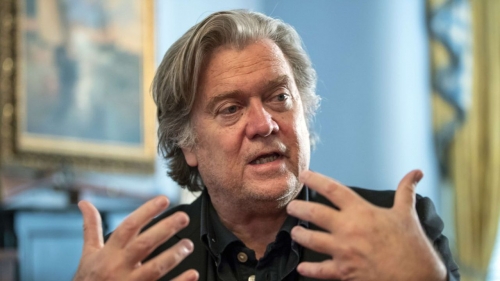
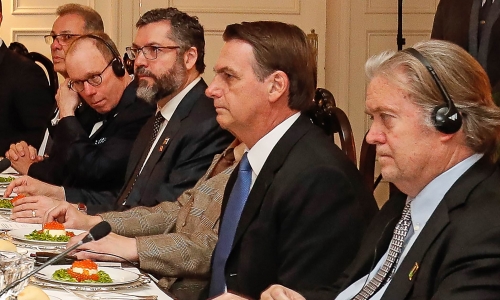


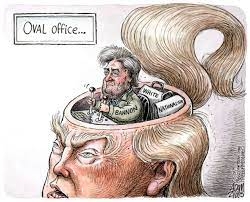 Accomplissant une démarche suggérée à Trump par Steve Bannon, les États-Unis d'Amérique ont déplacé, le 14 mai 2018, leur ambassade de Tel-Aviv à Jérusalem, reconnaissant officiellement la ville sainte comme la capitale de l'entité sioniste établie en Palestine. Alors que l'Union européenne et la grande majorité des États membres, opposés à l'initiative de Washington, ont jugé bon de ne pas accepter l'invitation à assister à l'inauguration de la nouvelle ambassade, trois pays au leadership souverainiste (Hongrie, Autriche, République tchèque) ont au contraire envoyé leurs représentants.
Accomplissant une démarche suggérée à Trump par Steve Bannon, les États-Unis d'Amérique ont déplacé, le 14 mai 2018, leur ambassade de Tel-Aviv à Jérusalem, reconnaissant officiellement la ville sainte comme la capitale de l'entité sioniste établie en Palestine. Alors que l'Union européenne et la grande majorité des États membres, opposés à l'initiative de Washington, ont jugé bon de ne pas accepter l'invitation à assister à l'inauguration de la nouvelle ambassade, trois pays au leadership souverainiste (Hongrie, Autriche, République tchèque) ont au contraire envoyé leurs représentants.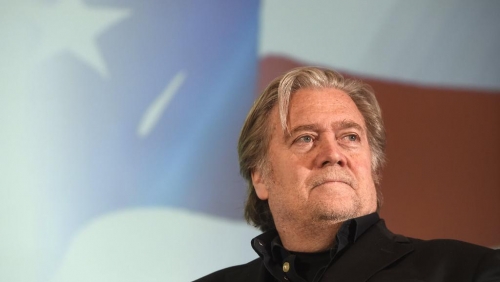
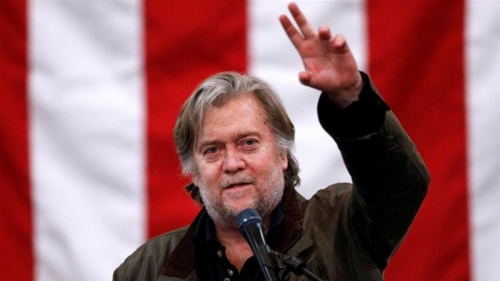
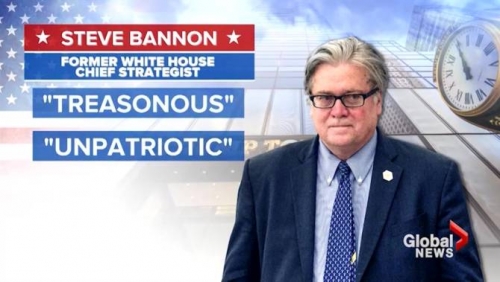
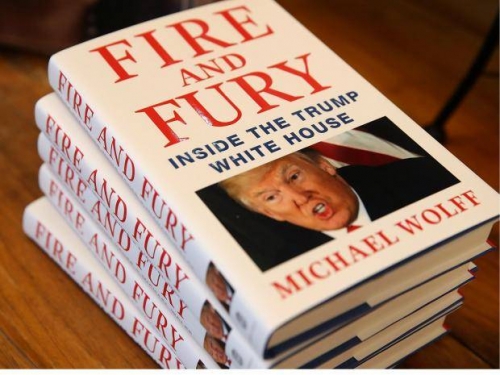
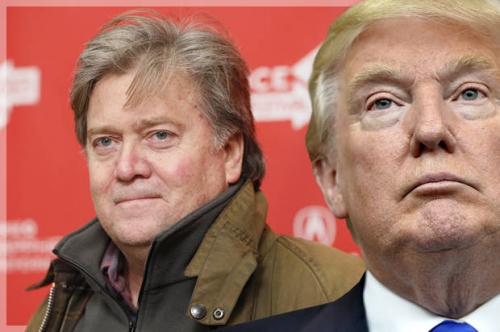

 Bannon est extrêmement influencé par les travaux de deux commentateurs de la sorte que nous nommerions “crisologues” tant le concept de crise (crisologie) est au centre de toutes nos réflexions, Neil Howe et William Strauss, auteurs de An American Prophecy, en 1997. Les deux auteurs adoptent une approche de l’actuelle situation, – la grande Crise se faisant déjà sentir dès la fin du communisme avec la mise en cause radicale de la notion de Progrès, – qui se réfère aux théories cycliques de la Tradition. « [Leur] analyse rejette les promesses des historiens occidentaux modernes de développement social et économie linéaire (progrès continuel et déclin) ou chaotique (trop de complexité pour révéler n’importe quelle direction). Au lieu de cela, ils adoptent la vision d’à peu près toutes les sociétés traditionnelles : que le temps social est un temps cyclique dans lequel les événements sont significatifs seulement dans la mesure où ils sont caractérisés par ce que le philosophe Mircea Eliade nommait “reconstitution”. Dans l’espace cyclique, une fois que vous avez écarté les accidents accessoires et sans signification, ainsi que la technologie, il vous reste un nombre limité de conceptions sociales, qui tendent à se répéter selon un ordre bien fixé... »
Bannon est extrêmement influencé par les travaux de deux commentateurs de la sorte que nous nommerions “crisologues” tant le concept de crise (crisologie) est au centre de toutes nos réflexions, Neil Howe et William Strauss, auteurs de An American Prophecy, en 1997. Les deux auteurs adoptent une approche de l’actuelle situation, – la grande Crise se faisant déjà sentir dès la fin du communisme avec la mise en cause radicale de la notion de Progrès, – qui se réfère aux théories cycliques de la Tradition. « [Leur] analyse rejette les promesses des historiens occidentaux modernes de développement social et économie linéaire (progrès continuel et déclin) ou chaotique (trop de complexité pour révéler n’importe quelle direction). Au lieu de cela, ils adoptent la vision d’à peu près toutes les sociétés traditionnelles : que le temps social est un temps cyclique dans lequel les événements sont significatifs seulement dans la mesure où ils sont caractérisés par ce que le philosophe Mircea Eliade nommait “reconstitution”. Dans l’espace cyclique, une fois que vous avez écarté les accidents accessoires et sans signification, ainsi que la technologie, il vous reste un nombre limité de conceptions sociales, qui tendent à se répéter selon un ordre bien fixé... »



